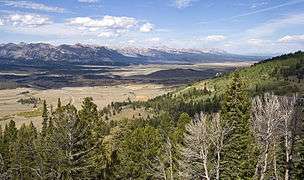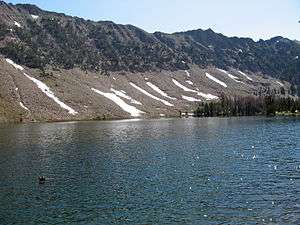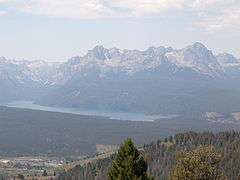Sawtooth National Recreation Area
| Sawtooth National Recreation Area | |
|---|---|
|
IUCN category V (protected landscape/seascape) | |
|
Stanley Lake in Sawtooth National Recreation Area | |
 | |
| Location | Blaine, Boise, Custer, and Elmore counties, Idaho, United States |
| Nearest city | Sun Valley, Idaho |
| Coordinates | 44°N 115°W / 44°N 115°WCoordinates: 44°N 115°W / 44°N 115°W |
| Area | 730,864 acres (295,770 ha)[1] |
| Established | August 22, 1972 |
| Governing body | U.S. Forest Service |
| Website | http://www.fs.usda.gov/attmain/sawtooth/specialplaces |
The Sawtooth National Recreation Area (SNRA) is a National Recreation Area located in central Idaho that is managed as part of Sawtooth National Forest. The recreation area was established on August 22, 1972, is managed by the U.S. Forest Service, and includes the Sawtooth, Hemingway–Boulders, and White Clouds wilderness areas.[2][3][4] Activities within the 730,864-acre (2,957.70 km2) recreation area include hiking, backpacking, White water rafting, camping, rock climbing, kayaking, mountain biking, fishing, and hunting.[1][5]
The SNRA headquarters are about seven miles (11 km) north of Ketchum on Highway 75, and the SNRA also has a ranger station in Stanley, near its northern boundary.[6]
History
The SNRA was created on August 22, 1972 by Public Law 22-400, which including creating the Sawtooth Wilderness from the Sawtooth Primitive Area.[2] The White Clouds and Hemingway–Boulders wilderness areas were created on August 7, 2015 by Public Law 114-46.[3][4]
Geology

Much of the SNRA was heavily glaciated, especially in the Sawtooth Mountains where remnants of these glaciers exist as glacial lakes, moraines, hanging valleys, cirques, and arêtes. The Sawtooth Fault stretches 40 mi (64 km) long, and runs through the Sawtooth Valley, while the two past large earthquakes likely took place on the fault around 7,000 and 4,000 years b.p.[7][8]
Mountains
The Sawtooth Mountains are located within the SNRA, along with the White Cloud, Boulder, and Smoky mountains.[6] The highest point in the SNRA is Castle Peak at 11,815 ft (3,601 m) in the White Cloud Mountains, while the second highest point is Ryan Peak at 11,714 ft (3,570 m) in the Boulder Mountains. Thompson Peak, at an elevation of 10,751 ft (3,277 m), is the highest point in the Sawtooth Mountains, while Saviers Peak at 10,441 feet (3,182 m) is the highest point in the Smoky Mountains.[6][9][10]
Rivers
The headwaters of the Salmon River, also known as the "River of No Return" are in the SNRA, and the river flows north through the Sawtooth Valley before turning east in Stanley and following the northern border of the SNRA. The headwaters of the Big Wood, Boise, and Payette rivers are also in SNRA.[6]
Lakes
There are hundreds of lakes in the SNRA, most of which have been created by alpine glaciers. The largest lakes are Redfish, Alturas, Pettit, Yellow Belly, Stanley, and Sawtooth lakes.[6]
Wildlife
Timber wolves were reintroduced in the 1990s and plans to reintroduce grizzly bears have been abandoned.[11][12] The SNRA contains prime habitat for wolverines and the endangered Canadian lynx, but no recent sightings have been reported.[5] Bull trout are the management indicator species for the SNRA and population monitoring efforts are undertaken every year.[13][14]
- List of animals of the Sawtooth National Recreation Area
- List of birds of the Sawtooth National Recreation Area
Popular culture

A 2003 memoir by John Rember, Traplines: Coming Home to the Sawtooth Valley, describes the life and culture of Stanley, Idaho before and after establishment of the Sawtooth National Recreation Area.[15]
Clint Eastwood's 1985 film Pale Rider was filmed in the SNRA, mostly in the Boulder Mountains in the fall of 1984. The opening credits scene was shot south of Stanley in front of the Sawtooth Mountains.[16] The SNRA is one of the settings of the 2010 3-D computer animated comedy drama film Alpha and Omega.[17][18][19]
The Idaho Department of Motor Vehicles also created a license plate depicting the SNRA (see right).[20]
Gallery
 Sawtooth Valley from Galena Summit
Sawtooth Valley from Galena Summit- Sawtooth Mountains
- Sawtooth Lake
- Parks Peak
 Washington Lake
Washington Lake- Fourth of July Lake
- Fisher Creek Trail
- Warms Springs Creak Meadow
- Sawtooth Valley and Sawtooth Mountains
- Grand Mogul and Redfish Lake Creek Valley
- Stanley Ranger Station
- Smith Falls
- Falls Creek Valley
- Sawtooth Valley
 Redfish Lake (from Boundary Creek)
Redfish Lake (from Boundary Creek) The SW end of Redfish Lake (Redfish Lake Creek Canyon)
The SW end of Redfish Lake (Redfish Lake Creek Canyon)
See also
References
- 1 2 "Land Areas of the National Forest System". U.S. Forest Service. November 2014. Archived from the original (PDF) on January 6, 2015. Retrieved January 6, 2015.
- 1 2 Dant Ewert, Sara E. (Summer 2000). "Peak park politics: the struggle over the Sawtooths, from Borah to Church". The Pacific Northwest Quarterly. Seattle, WA: University of Washington. 91 (3): 138–149. ISSN 0030-8803. JSTOR 40492581.
- 1 2 Landers, Rich (August 4, 2015). "Idaho's Boulder White-Clouds Wilderness Approved". The Spokesman-Review. Archived from the original on August 4, 2015.
- 1 2 Simpson, Mike. "H.R. 1138". U.S. Congress. Archived from the original (PDF) on August 4, 2015.
- 1 2 "Sawtooth National Forest". U.S. Forest Service. Retrieved August 12, 2015.
- 1 2 3 4 5 Sawtooth National Forest (Map) (2012 ed.). 1:126,720. Sawtooth National Forest, U.S. Forest Service.
- ↑ US & Canada, BBC News (18 November 2010). "Scientists find new seismic fault in Rocky Mountains". British Broadcasting Corporation. Retrieved 20 November 2010.
- ↑ Wall, Tim (November 19, 2010). "Large Seismic Fault Found in the Rockies". Discovery News. Retrieved 20 November 2010.
- ↑ Lopez, T. (October 1, 2000). Idaho, a climbing guide: climbs, scrambles, and hikes (2nd ed.). Seattle, WA: Mountaineers Books. ISBN 978-0-89886-608-7.
- ↑ "U.S. Board on Geographic Names". USGS. Retrieved May 9, 2012.
- ↑ Ring, Ray (May 27, 2002). "Wolf at the Door". High Country News. Archived from the original on February 12, 2013. Retrieved August 26, 2012.
- ↑ Merrill, Troy; Mattson, David J.; Wright, R. Gerald; Quigley, Howard B. (February 1999). "Defining landscapes suitable for restoration of grizzly bears Ursus arctos in Idaho". Biological Conservation. Elsevier. 87 (2): 231–248. doi:10.1016/S0006-3207(98)00057-3. ISSN 0006-3207. Archived from the original (PDF) on February 12, 2013.
- ↑ Isaak, Dan; Rieman, Bruce; Horan, Dona (April 2009). "A watershed-scale monitoring protocoal for bull trout". Fort Collins, CO: Rocky Mountain Research Station, U.S. Forest Service. Archived from the original (pdf) on February 12, 2013. Retrieved May 21, 2012.
- ↑ "Focus: Bull Trout Monitoring". Rocky Mountain Research Station. Archived from the original (pdf) on February 12, 2013. Retrieved May 11, 2012.
- ↑ Rember, John (2003). Traplines: Coming Home to Sawtooth Valley (1st Pantheon ed.). New York: Pantheon Books. ISBN 0375422072. OCLC 50604950.
- ↑ Heumann, Joseph K.; Murray, Robin L. (2004). "Pale Rider environmental politics, Eastwood style". Jump Cut (47). Archived from the original on February 12, 2013. Retrieved May 22, 2012.
- ↑ "Film Review: Alpha and Omega". Film Journal International. September 17, 2010. Archived from the original on February 12, 2013. Retrieved January 16, 2012.
- ↑ Bell, Anthony and Gluck, Ben (Directors) (September 17, 2010). Alpha and Omega (film). Lionsgate.
- ↑ McCarthy, Rebecca (August 1, 2010). Alpha and Omega: Kate and Humphrey's Big Adventure. New York, NY: Scholastic. ISBN 978-0-545-21460-5.
- ↑ "Personalized Plates for Your Vehicle and Souvenir Sample Plates". Idaho Transportation Department. Archived from the original on February 12, 2013. Retrieved May 11, 2012.
External links
- U.S. Forest Service - Sawtooth National Recreation Area
- Sawtooth Camera